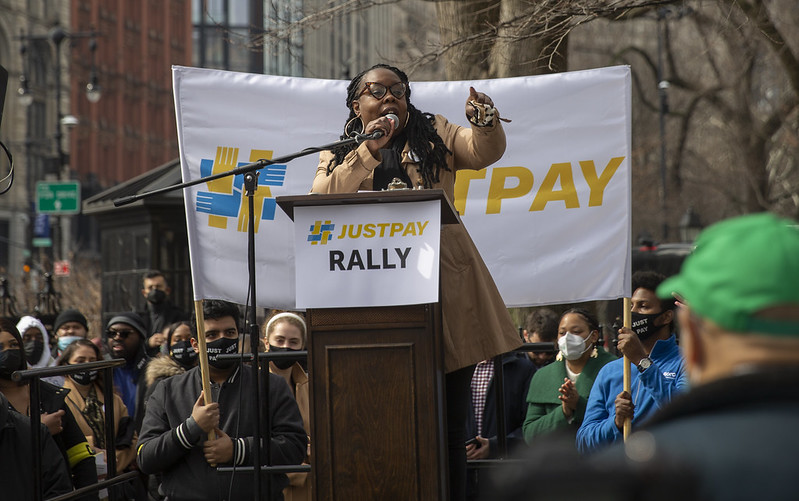Hundreds of people gathered outside City Hall this morning to call on Mayor Eric Adams and the City Council to address low pay for human services workers on city contracts.
In attendance were a number of nonprofits, labor unions that make up the Just Pay campaign. And several City Council members including Althea Stevens (D – Queens), Diana Ayala (D – Bronx) and Carmen De La Rosa (D – Manhattan). Maria Lizardo, executive director of Northern Manhattan Improvement Corporation, stressed that the human services sector should receive equal pay to city employees because they’ve been essential workers before and during the pandemic.
“We are here today to let the city know that we want just pay,” Lizardo said. “That we deserve just pay. That the human services sector is essential. And guess what? Before COVID, we were essential. During COVID, we are essential.”
Lizardo listed several vital services the nonprofit sector has provided over the last two years when the number of struggling New Yorkers has grown significantly.
“It has been our workforce that has been out there running food pantries, so New Yorkers could have something to eat,” Lizardo said “It has been our workforce that has been providing childcare, so essential workers and first responders could go to work. It is our workforce that has been providing shelter services to the homeless and victims of domestic violence. It is our workforce that delivered meals to seniors and pulled them to make sure that they were not isolated and hungry.”
Lizardo said the coalition is calling for a cost of living adjustment to be included in all city contracts for human services workers every year. A living wage floor of at least $21 an hour at the city and state levels.
“Everything has gone up except our salaries,” she said. “So, we need that $21 an hour as the minimum.”
And they want the city to create a fund with a comprehensive wage and benefits schedule that’s comparable to what city employees are entitled to.
Stevens said this sector is made up primarily of women and people of color who deserve fair pay.
“The momentum of New York City’s recovery endeavors continues, and we must stand with the women and people of color in underserved communities as they are being affected by this the most,” Stevens said. “We migrate from contracts that have provided no benefit to these essential services workers, and provide everyone with equal opportunities for advancement and the compensation that is deserved.”
Chan Henry, a case manager for the homeless services organization Urban Pathways, said working in the social services sector during the pandemic has been particularly trying. She said her clients have faced a number of barriers to getting services like problems making appointments and challenges getting paperwork updated, which has doubled the workload of her and her coworkers.
At the same time, Henry said, the pandemic has caused a number of personal financial struggles that are making it harder to live on the wage she’s currently paid.
“Every month, I am faced with difficult choices on how to spend my paycheck,” she said “Do pay my ever-increasing electrical bill? Or do I buy groceries that are also increasing in price?”
This low pay, Henry said, leaves her facing many of the same financial challenges as her own clients.
“The irony of assisting people experiencing homelessness and financial instability, when I’m on the brink of the same instabilities, is extremely frustrating,” Henry said. “ I’m always encouraging my clients to save. I learned how to budget their income. How do I teach them financial management when I am unable to take my own advice?”







